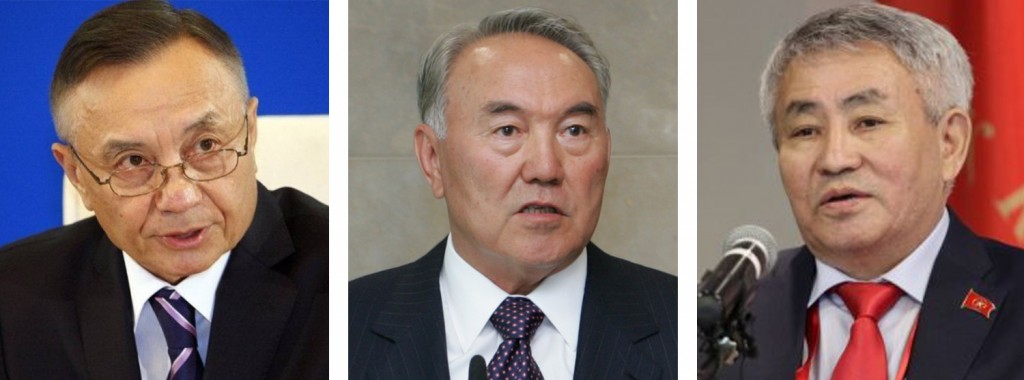ASTANA – Abelgazy Kussainov, Turgun Syzdykov and incumbent President Nursultan Nazarbayev remain the three official candidates in Kazakhstan’s early presidential election, which has been called for April 26, and hundreds of international observers are preparing to register to take part in monitoring the contest.
Nazarbayev and Syzdykov are the only two candidates to have been nominated by political parties, while 25 self-nominated candidates threw their hats in the ring before the March 15 cut-off, the country’s Central Election Commission reported. The three official candidates have passed the Kazakh language exam, collected the requisite 93,012 signatures supporting their campaign, provided tax information and paid the $5,700 election deposit, the Central Election Commission confirmed.
Syzdykov, a veteran of the Communist People’s Party of Kazakhstan with a decades-long civil service career, was nominated by his party in early March. Nazarbayev was nominated unanimously by the ruling Nur Otan party on March 11. Kussainov, who has a 35-year career in local and central government positions, including serving in the Kazakh Senate, in two ministries and as Akim (Governor) of Karaganda, is the only self-nominated candidate announced by the CEC as having successfully completed the full election nomination process.
“Elections are always a possibility to raise important issues of the society and to draw attention to the vital problems of every human life like the environmental issues and security,” Tengrinews.kz quoted Kussainov as saying on March 13. “My colossal work and life experience have convinced me that we are underestimating these problems. Therefore, my goal in this election is to convey these questions of our existence to our society.”
Mels Yeleussizov, head of the Tabigat Ecological Union, who has dropped out of the race, said he’d joined to shine a light on ecological problems within the country, which he said were more important than the government’s anti-crisis programme. Yeleussizov also ran in 2011, for the same reason, but is known to have voted for Nazarbayev. Six self-nominated candidates declined to take the language exam, ending their candidacies. The nomination process may be ongoing for some other self-nominated candidates; most, however, have either declined to take the language exam or otherwise dropped out of the race.
The nominees had until March 25 to collect the required more than 90,000 signatures in at least nine out of 14 regions of Kazakhstan as well as the two largest cities with the special status, Astana and Almaty.
Nazarbayev will be promoting his Nurly Zhol economic stimulus package, which emphasises transport infrastructure development, and his Kazakhstan 2050 Strategy, which aims to raise Kazakhstan to join the world’s 30 most developed countries by 2050 and contains programmes to promote the development of key economic sectors, including small business, agriculture and industry. At the party congress during which he was nominated, he laid out five institutional reforms he recommended for the nation: forming a modern, professional and autonomous state apparatus; emphasising the rule of law, particularly laws that protect business and entrepreneurial activity; diversifying the economy and developing industry; supporting religious and ethnic harmony and a Kazakhstan identity based on citizenship; and encouraging transparency and accountability by the state.
Last week, both the Ak Zhol Democratic Party and the Party of Patriots of Kazakhstan (PPK) officially threw their support behind Nazarbayev, who has also received support from several of his country’s neighbours, including President Vladimir Putin of Russia.
As of March 10, about 100 members of foreign media had been accredited to observe the election, the CEC announced. Thirteen foreign election observers had been accredited by the CEC by March 20, Kazakh TV reported, including observers from Croatia, Estonia, Germany, Georgia, Israel and the Netherlands, with accreditation remaining open until April 20. About 430 mission representatives from the Organisation for Security and Cooperation in Europe (OSCE) will monitor the campaign, as well about the same number from the Commonwealth of Independent States.
Chairman of the CEC Kuandyk Turgankulov met with the head of the Election Observation Mission (EOM) from the OSCE Office for Democratic Institutions and Human Rights Cornelia Jonker on March 24, saying his organisation was open to cooperating with international observers and welcomed their engagement. Jonker, who has led observation missions to Kyrgyzstan and Serbia, was appointed to lead the observation mission in Kazakhstan last week.
Candidates for president of Kazakhstan must be Kazakhstan citizens by birth, no younger than 40, fluent in Kazakh language and have lived in the country for 15 years at the time of their candidacy. This presidential election campaign will end on April 24, followed by a so-called “day of silence” when no campaigning is allowed and the actual vote on April 26.

